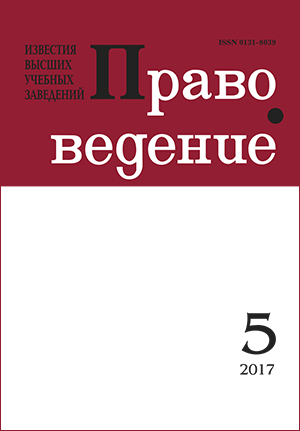Ideological and legal sources of formation of the concept of head of state in Spain
Abstract
The article is devoted to the ideological and legal sources of formation of the concept of head of state in Spain, different from a contemporary textbook model. The Spanish concept goes back to the Roman and medieval political and legal ideas which perceived a king as a head of a community (kingdom, republic). It is shown that initially the concept of head of state was recognized in Spanish constitutional law influenced by foreign jurisprudence which has generalized the experience of constitutional development of European and American states. The originality of the Spanish concept manifested itself in the 20th century. It was considered to be useful for constitutional acts and was adapted to political and legal realities of the country taking into account theoretical and legislative experience accumulated both in Spain (including ideas of F. Suárez) and in other countries (including Brazil). This concept was applied for the first time by the republicans in the Constitution of 1931 to define the place of the established president office within the system of state authorities, based on the experience of 1873 and the ideas of B. Constant. During the period of Franco’s dictatorship the office and later the institution legally named “head of state” was constituted. Its consideration as an extraordinary highest magistracy (until 1947) was close to the model proposed by S. Bolivar during the struggle of Spanish colonies for independence. Making the said concept universal (it covered the future king as well), the caudillo borrowed the concept of the head of state with its supremacy within the system of state powers from the legislation of France, Germany and Italy. The concept and the institute of the head of state appeared to be very effective in transition of Spain from an authoritarian regime to a democratic one after Franco’s death. The Constitution of 1978 established the Crown (as a version of the head of state) and the king status as the head of state. They are based on the country’s historical experience and reflect the identity, continuity and systemic nature of its constitutional institutions. The author concludes that the concept of head of state had different contents during various periods of the Spanish history.
Keywords:
head of state, institute, Spain, constitution, king, kingdom, neutral power, concept, F. Franco, form of state
Downloads
References
Downloads
Published
How to Cite
Issue
Section
License
Articles of "Pravovedenie" are open access distributed under the terms of the License Agreement with Saint Petersburg State University, which permits to the authors unrestricted distribution and self-archiving free of charge.




